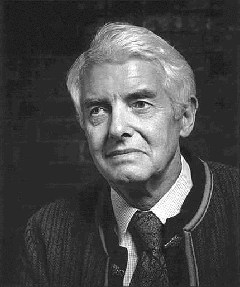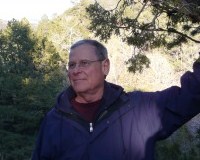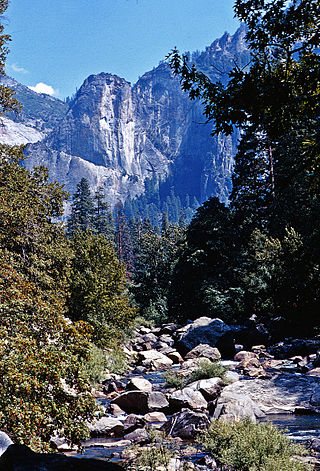
The organized environmental movement is represented by a wide range of non-governmental organizations or NGOs that seek to address environmental issues in the United States. They operate on local, national, and international scales. Environmental NGOs vary widely in political views and in the ways they seek to influence the environmental policy of the United States and other governments.

Nature conservation is the moral philosophy and conservation movement focused on protecting species from extinction, maintaining and restoring habitats, enhancing ecosystem services, and protecting biological diversity. A range of values underlie conservation, which can be guided by biocentrism, anthropocentrism, ecocentrism, and sentientism, environmental ideologies that inform ecocultural practices and identities. There has recently been a movement towards evidence-based conservation which calls for greater use of scientific evidence to improve the effectiveness of conservation efforts. As of 2018 15% of land and 7.3% of the oceans were protected. Many environmentalists set a target of protecting 30% of land and marine territory by 2030. In 2021, 16.64% of land and 7.9% of the oceans were protected. The 2022 IPCC report on climate impacts and adaptation, underlines the need to conserve 30% to 50% of the Earth's land, freshwater and ocean areas – echoing the 30% goal of the U.N.'s Convention on Biodiversity.
In environmental philosophy, environmental ethics is an established field of practical philosophy "which reconstructs the essential types of argumentation that can be made for protecting natural entities and the sustainable use of natural resources." The main competing paradigms are anthropocentrism, physiocentrism, and theocentrism. Environmental ethics exerts influence on a large range of disciplines including environmental law, environmental sociology, ecotheology, ecological economics, ecology and environmental geography.

John Muir, also known as "John of the Mountains" and "Father of the National Parks", was a Scottish-born American naturalist, author, environmental philosopher, botanist, zoologist, glaciologist, and early advocate for the preservation of wilderness in the United States.

John Wesley Powell was an American geologist, U.S. Army soldier, explorer of the American West, professor at Illinois Wesleyan University, and director of major scientific and cultural institutions. He is famous for his 1869 geographic expedition, a three-month river trip down the Green and Colorado rivers, including the first official U.S. government-sponsored passage through the Grand Canyon.
Agroecology is an academic discipline that studies ecological processes applied to agricultural production systems. Bringing ecological principles to bear can suggest new management approaches in agroecosystems. The term can refer to a science, a movement, or an agricultural practice. Agroecologists study a variety of agroecosystems. The field of agroecology is not associated with any one particular method of farming, whether it be organic, regenerative, integrated, or industrial, intensive or extensive, although some use the name specifically for alternative agriculture.

David Ross Brower was a prominent environmentalist and the founder of many environmental organizations, including the John Muir Institute for Environmental Studies (1997), Friends of the Earth (1969), Earth Island Institute (1982), North Cascades Conservation Council, and Fate of the Earth Conferences. From 1952 to 1969, he served as the first Executive Director of the Sierra Club, and served on its board three times: from 1941–1953; 1983–1988; and 1995–2000 as a petition candidate enlisted by reform-activists known as the John Muir Sierrans. As a younger man, he was a prominent mountaineer.
Spiritual ecology is an emerging field in religion, conservation, and academia that proposes that there is a spiritual facet to all issues related to conservation, environmentalism, and earth stewardship. Proponents of spiritual ecology assert a need for contemporary nature conservation work to include spiritual elements and for contemporary religion and spirituality to include awareness of and engagement in ecological issues.

J. Baird Callicott is an American philosopher whose work has been at the forefront of the new field of environmental philosophy and ethics. He is a University Distinguished Research Professor and a member of the Department of Philosophy and Religion Studies and the Institute of Applied Sciences at the University of North Texas. Callicott held the position of Professor of Philosophy and Natural Resources at the University of Wisconsin–Stevens Point from 1969 to 1995, where he taught the world's first course in environmental ethics in 1971. From 1994 to 2000, he served as vice president then president of the International Society for Environmental Ethics. Other distinguished positions include visiting professor of philosophy at Yale University; the University of California, Santa Barbara; the University of Hawaiʻi; and the University of Florida.
Marston Bates was an American zoologist and environmental author. Bates' studies on mosquitoes contributed to the understanding of the epidemiology of yellow fever in northern South America.
Ecology is a new science and considered as an important branch of biological science, having only become prominent during the second half of the 20th century. Ecological thought is derivative of established currents in philosophy, particularly from ethics and politics.

Environmental history is the study of human interaction with the natural world over time, emphasising the active role nature plays in influencing human affairs and vice versa.

Environmentalism or environmental rights is a broad philosophy, ideology, and social movement about supporting life, habitats, and surroundings. While environmentalism focuses more on the environmental and nature-related aspects of green ideology and politics, ecologism combines the ideology of social ecology and environmentalism. Ecologism is more commonly used in continental European languages, while environmentalism is more commonly used in English but the words have slightly different connotations.
Ecotheology is a form of constructive theology that focuses on the interrelationships of religion and nature, particularly in the light of environmental concerns. Ecotheology generally starts from the premise that a relationship exists between human religious/spiritual worldviews and the degradation or restoration and preservation of nature. It explores the interaction between ecological values, such as sustainability, and the human domination of nature. The movement has produced numerous religious-environmental projects around the world.
Hobart Muir Smith, born Frederick William Stouffer, was an American herpetologist. He is credited with describing more than 100 new species of American reptiles and amphibians. In addition, he has been honored by having at least six species named after him, including the southwestern blackhead snake, Smith's earth snake, Smith's arboreal alligator lizard, Hobart's anadia, Hobart Smith's anole, and Smith's rose-bellied lizard. At 100 years of age, Smith continued to be an active and productive herpetologist. Although he published on a wide range of herpetological subjects, his main focus throughout his career was on the amphibians and reptiles of Mexico, including taxonomy, bibliographies, and history. Having published more than 1,600 manuscripts, he surpassed all contemporaries and remains the most published herpetologist of all time.
Christian views on environmentalism vary greatly amongst different Christians and Christian denominations.
John Robert McNeill is an American environmental historian, author, and professor at Georgetown University. He is best known for "pioneering the study of environmental history". In 2000 he published Something New Under the Sun: An Environmental History of the Twentieth-Century World, which argues that human activity during the 20th century led to environmental changes on an unprecedented scale, primarily due to the energy system built around fossil fuels.

Conservation in the United States can be traced back to the 19th century with the formation of the first National Park. Conservation generally refers to the act of consciously and efficiently using land and/or its natural resources. This can be in the form of setting aside tracts of land for protection from hunting or urban development, or it can take the form of using less resources such as metal, water, or coal. Usually, this process of conservation occurs through or after legislation on local or national levels is passed.
Bron Raymond Taylor is an American scholar and conservationist. He is professor of religion and nature at the University of Florida and has also been an affiliated scholar with the Center for Environment and Development at the University of Oslo. Taylor works principally in the areas of religion and ecology, environmental ethics and environmental philosophy. He is also a prominent historian and ethnographer of environmentalism and especially radical environmentalist movements, surfing culture and nature-based spiritualities. Taylor is also editor-in-chief of the Encyclopedia of Religion and Nature and subsequently founded the International Society for the Study of Religion, Nature and Culture, serving as its president from 2006 to 2009. He also founded the society's affiliated Journal for the Study of Religion, Nature and Culture, serving as its editor since 2007.
Arcadian ecology is a school of thought that advocates for a harmonious relationship between humans and nature. It is named for the mountainous Arcady region of Greece. Gilbert White's seminal piece "Natural History of Selbourne" promotes a benign attitude towards nature and advocates for a peaceful coexistence between organisms. It was an individual realization of ancient arcadian ideas of harmonious interactions between humans and nature. The evolution of Arcadian ecological thought continuously reverts to the detailed letters and poems in this work.








